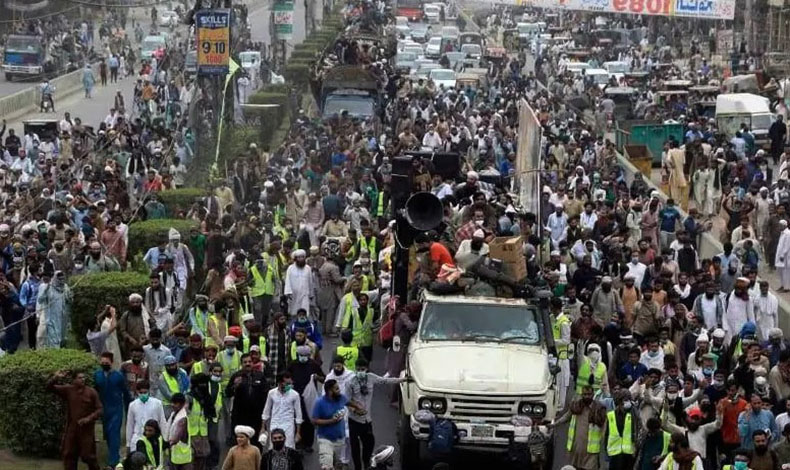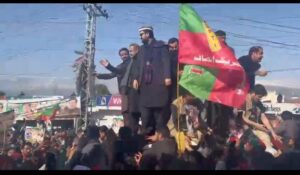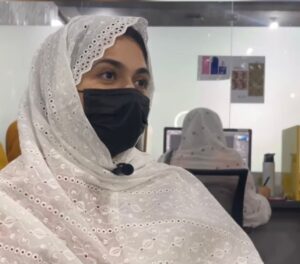The Tehreek-e-Labbaik Pakistan (TLP) protest march, announced as the “Labbaik Ya Aqsa Million March,” has remained stationary in the central Punjab city of Muridke for the third consecutive day as talks between the religious group’s leadership and government representatives failed to reach an agreement.
The standoff has left hundreds of TLP supporters waiting on the Grand Trunk Road under heavy police deployment, with the situation tense but controlled. Despite mounting speculation on social media, both the TLP and government officials have refrained from confirming whether the march will proceed toward Islamabad or disperse peacefully.
No breakthrough in talks
TLP Lahore Division spokesperson Hafiz Irfan Qadri told BBC correspondent Shehzad Malik that negotiations between the group’s leaders and a government team “have not succeeded so far.” He said that TLP chief Saad Rizvi has called an emergency press conference at 6 p.m. in Muridke to announce the party’s next course of action.
TLP’s social media team, travelling alongside the convoy, also confirmed that discussions were still underway but added that “no final decision” had been communicated to the crowd. “The leaders who were negotiating have not returned to the stage yet. Slogans continue to echo through the area as supporters wait for instructions,” one media team member said.
According to reports circulating in the local media, the government’s negotiation panel includes Federal Interior Minister Rana Sanaullah, Punjab Minister Khawaja Salman Rafique, and Prime Minister’s Special Representative on Religious Harmony, Allama Tahir Ashrafi. Officials have described the talks as “constructive but inconclusive,” with both sides agreeing on some points while remaining divided on others.
Government sources said the negotiating team has urged TLP to immediately call off its march, citing fragile law and order conditions, ongoing tensions along the Pakistan-Afghanistan border, and concerns over possible unrest in the capital.
Protesters camped at Muridke
Eyewitnesses reported that the TLP convoy, consisting of hundreds of vehicles and buses, had reached Muridke late Saturday evening and set up a temporary camp along the main GT Road. Party organizers distributed food and water to participants, while clerics continued to deliver speeches from the stage, keeping morale high.
By Sunday morning, supporters began gathering again, expecting the march to resume toward Islamabad. However, as evening approached, the convoy remained in place. Organizers repeatedly urged patience, assuring participants that the leadership would announce a decision soon.
The TLP launched its “Labbaik Ya Aqsa Million March” from Lahore on 10 October, calling for nationwide protests against Israel’s actions in Gaza and what the group described as “the silence of Muslim governments.” Thousands of supporters joined the procession as it departed from Data Darbar, chanting anti-government and pro-Palestine slogans. However, the march quickly turned confrontational. Clashes were reported in some areas between TLP workers and police, leading to minor injuries on both sides. As the convoy progressed through Punjab, shortages of food and logistical difficulties reportedly caused a decline in the number of participants.
Despite the reduction in crowd size, TLP officials insist that their supporters from other cities are preparing to join once the convoy resumes movement toward the capital.
Controversy over arrests
TLP leaders have strongly criticized Punjab Police for allegedly detaining female members of Saad Rizvi’s family during a raid at his residence. The party termed the move as “an act of intimidation.” In response, Pakistan Muslim League-Nawaz lawmaker and Punjab Women Protection Authority Chairperson Hina Pervaiz Butt clarified in a post on social media platform X that “Chief Minister Maryam Nawaz Sharif immediately ordered the release of all detained women,” denying any mistreatment.
Senior PML-N leader and former federal minister Khawaja Saad Rafique urged both the government and TLP to de-escalate tensions and pursue a peaceful resolution. “We don’t know what level of engagement took place before the TLP rally began,” he wrote on X. “But mutual confrontation only increases bitterness. Condemning Israel or the U.S. government should not mean turning Pakistan into a battlefield.”
He called upon neutral religious scholars to intervene as mediators, saying the country cannot afford further political or sectarian instability.
Uncertain road ahead
As night fell over Muridke, the fate of the TLP protest march remained uncertain. Thousands of supporters stayed camped along the highway, waiting for the outcome of ongoing talks. Security forces continued to monitor the area closely, with containers blocking key entry and exit points around the city to prevent any unauthorized movement toward Islamabad.
Officials in Lahore and Islamabad have reiterated that maintaining peace and order is the government’s top priority, while TLP leaders maintain that their movement will remain “peaceful but firm” until their demands are addressed.
Whether the TLP protest march resumes or dissolves after the latest round of negotiations, the standoff has once again highlighted the tense relationship between the religious group and the state — a recurring confrontation that continues to test Pakistan’s capacity for political dialogue and restraint.












